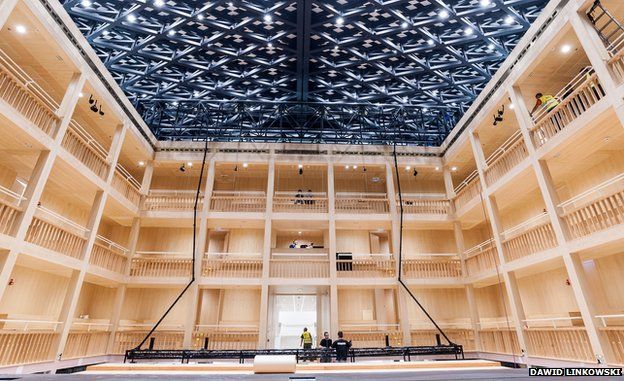Gdansk theatre reveals Poland's ties to Shakespeare
- Published

It's taken almost a quarter of a century to become a reality but the Shakespeare Theatre in Gdansk is finally opening its doors to the public.
You may be wondering why the Polish Baltic port city would build a theatre dedicated to England's Bard.
"The idea of having a Shakespearean theatre in Gdansk is not out of the blue, it has strong historical backing," the theatre's director, Jerzy Limon explains. The 64 year-old Shakespearean scholar came up with the project 25 years ago.
"English actors first came to Gdansk in 1601. They kept coming for over half a century and Shakespeare's plays were performed here during his lifetime."
Touring actors
Prof Limon sees it as a wonderful monument for cultural relations between Gdansk and London and monument to the artistic impact of English culture on the continent.
"Rock music is today's most conspicuous example of British cultural presence worldwide. But it started long ago with these companies that toured the continent and came to Gdansk almost every summer."
The touring English actors' written applications to perform in Gdansk for over 20 seasons still exist.
They came seeking patronage from aristocrats or royalty to enable them to earn enough money to survive the winters.
And they appear to have been popular.
"In one of the surviving documents the author says the English were followed by virgins who travelled from one town to another," Prof Limon says.
"Like groupies?" I ask. "Exactly," he says.
At first they performed in English. Gdansk at the time had one of the largest English-speaking communities on the continent, numbering about 1,000 English and Scots.
The port city was part of the Hanseatic League, a commercial and defensive confederation of merchant guilds and market towns that dominated trade along the coast of northern Europe.
But the league's lingua franca was German, so by about 1610 the English actors began performing in that language using prose translations.
They performed in a wooden playhouse called the Fencing School, a galleried unroofed building which hosted fencing classes and bear baiting as well as performances of Shakespeare's plays.
The new theatre is built in the place where the Fencing School stood.
The original plan was to follow the example of the open-air Globe Theatre in London but they decided it should stay open throughout the year because of the cost.
Venetian architect Renato Rizzi won a competition to design the building, and some have likened his work to an oyster: ugly on the outside but beautiful inside.
The theatre is next to the remnants of the city's 14th Century walls and the exterior contains some of the Gothic elements that dominate the style of Gdansk's Old Town, such as buttresses.
It's built of dark Belgian brick and there are no visible windows because they are obscured by a six-metre-high perimeter wall.
The contrast with the light interior is sharp. The lobby has pale cream walls, a Bulgarian marble floor and Polish birch wood ceilings and interiors.
The auditorium is modelled on the old Fencing School, with wooden galleries on three sides and a standing area in front of a classical box stage.
A series of 56 lifts enables the area in front of the stage to be transformed into an Elizabethan-era thrust stage.
Above there is a 90-tonne retractable roof that opens in three minutes to allow for daylight performances in good weather.
Poland lost its connections with the West after World War Two when it was cut off by the Iron Curtain.
But when the Berlin Wall came down, Prof Limon created an NGO in the 1990s to promote his theatre idea.
The Polish theatre is the first in the world to feature an opening roof
EU funding
During early fundraising attempts, potential early sponsors were more interested in the free sparkling wine on offer than giving concrete support.
Things began to change in 1993 when the Prince of Wales agreed to be patron of the project.
"In my 25 years' experience of dealing with all circles of society he is the only person so far who responded to a letter from a nobody," he said.
The local authorities gave the project a valuable piece of real estate on the outskirts of the Old Town.
Funding the construction only became possible after Poland joined the EU in 2004. Brussels' cash has paid for three-quarters of the £18m (23m euros) cost, with the remainder provided by local authorities. Building finally began in 2011 with the bulldozers performing a ballet.
Following the opening there will be a British week with performances of Hamlet by the Globe Theatre and Missing by the Gecko Theatre.
Later this month, the theatre will host the city's 18th Shakespeare Festival, which has so far included more than 200 different subtitled productions from 40-plus countries.
Shakespeare is still popular enough in Poland to be taught in schools and his plays are staged in practically all theatres across the country, with about a dozen new productions every year.
He is also one of the relatively few historical figures to have his name Polonised. In Poland he's known as Szekspir.
"Shakespeare always reminds us how much we have in common because the language he uses and the problems he describes are universal," says Prof Limon.
- Published15 September 2014